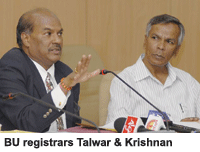Once one of the country’s most promising post-independence varsities, Bangalore University, (BU, estb.1964) whose techno-savvy graduates powered the spectacular growth of India’s globally respected IT industry, is in a tailspin. Since the early 1990s when a new genre of peasant leaders began calling the shots in the Vidhan Soudha, Bangalore — the ornate epicentre of political power in the southern state of Karnataka (pop.57 million) — the varsity’s descent into nihilistic politics has increasingly begun to mirror the fractious caste-driven political wrangling in Vidhan Soudha.
Right now Bangalore University, which has 473 affiliated colleges with an aggregate enrolment of 700,000 students, is split down the middle following a bitter row between vice chancellor Dr. N. Prabhu Dev and registrars M.G. Krishnan and V.G. Talwar. On April 2, Krishnan and Talwar submitted a memorandum to Karnataka governor H.R. Bhardwaj, chancellor of all universities in the state, accusing Prabhu Dev of splurging “public money to fund his lavish life style, and nepotism in appointment of an unstatutory core committee”.
“Four files with the records of his (Dr. Prabhu Dev’s) expenses have disappeared mysteriously from our cabin. These files pertained to two bills amounting to Rs.2.84 lakh and Rs.1 lakh drawn for the vice chancellor’s daily expenses,” Talwar, regis-trar (evaluation), told media persons in Bangalore. “It has been a painful, sad and humiliating experience since being appointed registrar. The provocation and humiliation at the hands of the VC is unbearable,” added Krishnan.
 This memorandum of the registrars to Bhardwaj follows recent orders of Prabhu Dev curtailing their powers. A week earlier on May 29, the VC’s office had ordered constitution of a 10-member committee to take exam-related decisions. Simultaneously the VC ordered transfer of administrative powers to deputy registrars in case the registrars “fail to obey”.
This memorandum of the registrars to Bhardwaj follows recent orders of Prabhu Dev curtailing their powers. A week earlier on May 29, the VC’s office had ordered constitution of a 10-member committee to take exam-related decisions. Simultaneously the VC ordered transfer of administrative powers to deputy registrars in case the registrars “fail to obey”.
Unfortunately for the BU registrars, their well-calculated move to go public and report Prabhu Dev’s misdemean-ours to the governor, backfired. On April 3, the governor/chancellor ordered an inquiry into complaints made against the two registrars, giving a clean chit to the vice chancellor. Bhardwaj appointed Justice I.P. Vashisht, a retired judge of the Allahabad high court, to probe allega-tions against the registrars and submit a report within the next two months.
The on-off confrontation between Prabhu Dev and Krishan plus Talwar can be traced back to November last year when the vice chancellor refused to allow the varsity’s newly-appointed registrars to assume office on the sprawling 1,100-acre university campus. The registrars, who had been appointed by order of the Karnataka state government’s higher education ministry dated November 13, were asked to desist from assuming charge until the VC’s office “received official communi-cation from the chief minister’s office”. This informal stay order angered a large section of BU students who alleged that the vice chancellor was reluctant to accept the registrars’ appointment because of “caste considerations”. Eventually after three days of student and faculty protests, rumour-mongering and uncertainty, on November 19 Krishnan and Talwar assumed charge as registrars with the vice chancellor promising to “work together for the betterment of the university”.
The outcome of this constant bickering between top officials of the university is that academic standards and infrastructure of this once highly-reputed university are going from bad to worse. Yet, the biggest casualties of this non-stop brouhaha are the university’s 4,000 postgrad students dished out obsolete curri-culums by indifferent faculty. Moreover constant political interference in the appointment of members to the Bangalore University Syndicate — the university’s highest decision-making authority — have made matters worse.
“In most universities across the country, including Bangalore University, issues relating to outdated curriculums, evaluation reforms, and student welfare are not given the high priority they deserve. This is because in most cases the autonomy of universities is not well defined and there is constant political interference in faculty appointments, governance and financial management. If the issue of raising quality in higher education needs to be seriously addressed, there must be complete transparency in all faculty appointments and the university must be given full academic and administrative auto-nomy,” says B.K. Anitha, associate professor of social sciences at Bangalore’s show-piece National Institute of Advanced Studies.
Although the reforms proposed by Prof. Anitha are included in the draft National Council for Higher Education and Research Bill, it will be sometime before the Bill is enacted into law. Meanwhile BU’s future is likely to become darker before it becomes brighter.
Summiya Yasmeen (Bangalore)